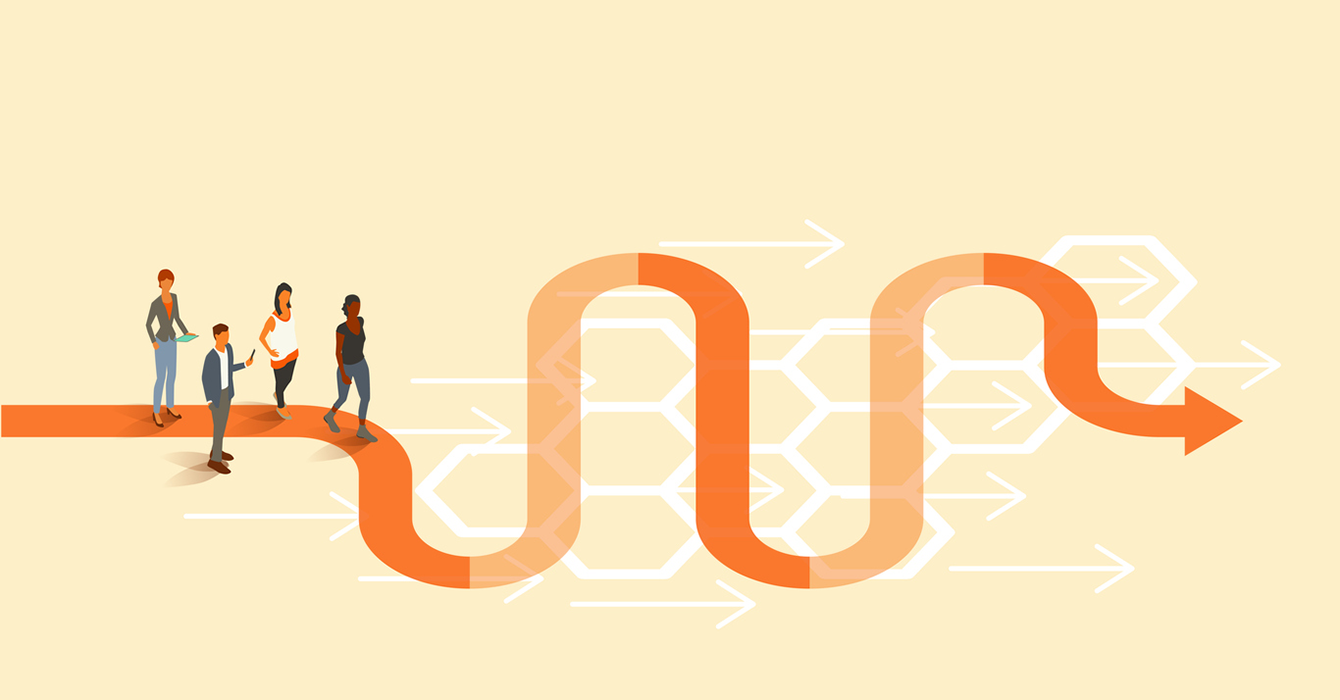After years of suppression, religious life in China is growing, and is in many ways a response to that nation’s growing prosperity, says Ian Johnson.
“Since the 1980s, as China has gotten wealthier, religion has only grown,” Johnson said. “It’s almost as if people need something else to believe in.”
From 1966 to 1976, during Communist Party Chair Mao Zedong’s Cultural Revolution, religion in China was violently suppressed, with hundreds of thousands of temples, mosques and churches seized or destroyed. Though Buddhism, Islam, Taoism, and Protestant and Catholic Christianity were later allowed to continue, most government leaders assumed that religion would eventually die out.
But instead, religious life has grown since the 1980s, said Johnson, the author of “The Souls of China: The Return of Religion After Mao.”
“There’s one person I quote in the book who said, ‘We used to think we were unhappy because we were poor. Now a lot of us aren’t poor anymore, but we’re still unhappy, and we realize there’s something missing.’”
For many Chinese, what is missing is spiritual life, Johnson said.
“People are turning to all of the five religions, but especially growing fast is Protestant Christianity and traditional Chinese religions like Buddhism,” he said.
 An author and reporter for The New York Times, The New Yorker, The Wall Street Journal and other publications, Johnson focuses on society, religion and history. He was twice nominated for the Pulitzer Prize and won in 2001 for his coverage of China. “The Souls of China” describes China’s religious revival and the country’s search for values.
An author and reporter for The New York Times, The New Yorker, The Wall Street Journal and other publications, Johnson focuses on society, religion and history. He was twice nominated for the Pulitzer Prize and won in 2001 for his coverage of China. “The Souls of China” describes China’s religious revival and the country’s search for values.
He was at Duke earlier this year to discuss his book with the Duke Asian/Pacific Studies Institute. He also spoke with Faith & Leadership. The following is an edited transcript.
Q: You say that religion has been overlooked in how we think about China and yet is critical to understanding that country. How so?
If you think of America, for example, no one can understand it or its politics if you didn’t know a bit of the history of the Puritans, or the faith and role of Southern Baptists. By the same token, religion historically has played and still plays a big role in Chinese society and how it is organized.
In the late 19th century, there was a big reaction against traditional religion in China. It was seen as superstitious and holding China back, and incompatible with being a modern nation. The old system was destroyed in the late 19th and early 20th century. Since then, China has been looking for something to replace it.
For a while, they had communism, but that collapsed during the Mao period. By the late 1970s, after so many famines and so much persecution, nobody believed in communism anymore. Since then, Chinese society has been adrift, with no shared moral values or ideas about how to hold society together.
But every society needs something like that. That’s the problem in China today, and it’s a big issue.
Q: Give us a historical overview of religion in China. Before Mao, China was virtually a religious state, a mingling of culture and religion.
The emperor was almost a quasi-divine figure, and officials got legitimacy through participating in religious rituals and rites. Temples in China were kind of like a cathedral and a city hall in medieval Europe.
The temples were run by committees of local gentry, the same people who would raise the militia or build new irrigation systems or roads. There were no city halls, so people tended to meet and congregate in temples. They were powerful places. When reformers tried to change Chinese society in the late 19th century, they went after power where it lay, in this traditional system of ruling China.
There was also a feeling that traditional Chinese religion was backward, and there was a big movement even in the late 19th century to convert temples to schools. They had this idea that they needed to catch up to the West in science, technology and education.
Some religion was OK; Western countries were heavily Christian. But they thought their own religions were the problem. That started this wave of anti-religious persecution that went throughout the 20th century.
Q: And under Mao, it all came to a head?
Yes. When the Communists took power in 1949, they were the most radical of the groups that wanted to change China. There had been others before that were skeptical of traditional religion, but the Communists really pushed all this through. It culminated from 1966 to 1976 with the Cultural Revolution, when hundreds and hundreds of thousands of temples, mosques and churches were closed. Pretty much all public religious life ended, and Mao was the only god who was allowed.
He was almost worshipped like a god. People went on pilgrimages to Beijing to see him and carried the Little Red Book like it was the Bible. Young people would go see Mao, and they would faint and become hysterical, like Beatlemania.
The Cultural Revolution ended with his death in 1976, and people began to realize that communism had been a disaster. China is communist only in name now.
Q: What has happened after Mao? What are we talking about when we talk about religion in China today?
Out of the old system, five groups formed. The official religions of China are Taoism, which is the only indigenous religion in China; Buddhism, which has been in China for a long time and came from India; Islam, which came to China quite a long time ago; then, for administrative purposes, Christianity is split into Protestantism and Catholicism.
Nothing else is allowed, which means the vast majority of traditional folk religions were declared to be superstitious and destroyed.
After the Cultural Revolution, they brought back the five religions. But the rulers at the time, Deng Xiaoping and others, saw religion as a relic of the old society. They thought it would be a mistake to destroy it, but they thought it would go away. Nobody thought it would take off. They thought it would disappear as old people died off, but the opposite happened, and religion began to pick up.
Since the 1980s, as China has gotten wealthier, religion has only grown. It’s almost as if people need something else to believe in. There is nothing to believe in, in China. There’s no state religion. The only thing the government has allowed in the past 40 years has been prosperity, getting rich. The slogan since the 1980s has been “To get rich is glorious.” But that is not adequate. Nobody can live on materialism alone.
There’s one person I quote in the book who said, “We used to think we were unhappy because we were poor. Now a lot of us aren’t poor anymore, but we’re still unhappy, and we realize there’s something missing.”
For a lot of people in China, what’s missing is spiritual life. People are turning to all of the five religions, but especially growing fast is Protestant Christianity and traditional Chinese religions like Buddhism.
Q: What about the current leader of China, Xi Jinping? What’s his stance on religion in China?
As a Communist Party official, Xi Jinping is supposed to be atheist, and he probably is. But as early as the 1980s, during his first assignment as a young official, he forged an alliance with a famous Buddhist monk for a couple of reasons.
One, his father was a Communist Party official who had a reputation for being somewhat sympathetic to religion. He worked with a lot of religious groups in western China when he was running Communist guerrilla movements and decided that religion wasn’t necessarily incompatible with communism, as long as it didn’t challenge the party. The elder Xi was in charge of religious work in the early 1980s and wrote the document that allowed religion to come back. When his son became a county chief, he took a lenient position toward religion and forged an alliance with this abbot.
They rebuilt a very famous Buddhist temple. Later, when he was getting promoted through the ranks, he sent his officials to go look at this county and said, “This is the way it ought to be done.”
I think the reason the party is doing this is that they realize there is this moral malaise in society. People are unhappy. It’s probably the biggest complaint you hear from Chinese people, beyond minor daily complaints and stuff like that -- the sense that society has no moral compass. Anything goes; there are no minimal moral standards. Anything to get ahead is OK.
Articles circulate on Chinese media about how somebody gets run over by a car and nobody stops to help, because nobody can be bothered. Or the food isn’t safe to eat and drink. There were tainted milk and infant formula scandals. It’s this feeling that you can’t trust anything.
Political scientists talk about social trust. You need to have social trust. You need to trust that when you go into the store, the food isn’t poisoned; otherwise, you’re not going to buy it. So it’s a basic premise of capitalism. This is why Xi Jinping and other leaders are not entirely opposed to religion in China growing.
Q: And you write that they are more favorably disposed to Buddhism but much less so to Christianity.
Yes. I think they feel that Buddhism and other traditional faiths, including Taoism, are more compatible with Chinese tradition. Also, they have this idea -- I think it’s mistaken -- that these religions won’t challenge the state so much.
The leaders are interested in personal piety and moral values that are helpful to society. I think they feel less comfortable with Christianity because there’s still the perception that Christianity is a foreign religion, even though Christianity has had a presence in China for about 400 years. More importantly, they feel that Christianity is still influenced by foreigners, and it has a social justice component that they don’t like.
Some churches are involved in relatively innocuous programs, like homeless shelters or orphanages, but some are more politically engaged. There was a big movement of lawyers who took on human rights cases, and about 25 percent of these lawyers were Protestants. Only about 5 percent of Chinese are Protestant, so that’s disproportionately high. Clearly, people are inspired in some way by the social gospel to get involved in cases of persecution.
There’s also perhaps a personal reason. When Xi Jinping was party secretary of Zhejiang province in southern China, there was a clash between church members and the police. The police went in to close down an illegal underground church. But the church members mobilized hundreds of people who came and surrounded the police, who retreated.
The guy who was the head of the police then is now the party secretary of Zhejiang, and Xi is now head of China. They both probably feel that Christians are troublemakers.
Between 2014 and 2016, there was a campaign to remove crosses on top of church steeples in this province. You can’t prove it, but it was payback -- “I was the police chief. You humiliated my police. Now, all your crosses are coming down.”
They didn’t close any churches. They took the crosses off 1,500 churches, but only one church was demolished. The other 1,499 were left, and they’re still there.
Q: What does Protestant Christianity look like in China?
After the Communists took over in 1949, they set up the five religious groups, including one Protestant, one Catholic. In the case of Catholics, they cut all ties to the Vatican; they set up a Chinese Catholic Church. And in the case of Protestants, they got rid of all denominations and said, “OK, you’re all Protestants now. There are no more Episcopalians or Baptists or whatever.”
The official Protestant churches have about 20 million members, according to government figures. But according to every other objective source, at least double that number are in nonregistered churches. This could be churches as small as a living room, where a dozen or two dozen people get together to pray, to big churches, like one I wrote about in my book. It has about 500 members and rents half a floor of an office building. They have two big services and started another church in another part of town. They have a seminary, a kindergarten and a bookstore.
These churches are not registered, so officially they’re illegal. But the government has decided that it’s not worth it to take them on, because tens of millions of people would be affected. These are growing quickly, but they don’t have church buildings. They’re not allowed to build a church.
Q: What are the numbers for all five major religions?
There are 23 million Muslims in China, defined by ethnicity. There are 10 ethnic groups that are Muslim, and if you add them up, it’s 23 million, but that assumes they are all practicing Muslims.
There are officially 6 million Catholics, up from 3 million in 1949. Unofficially, people say there are double that number, so I’d say it would be 12 million Catholics, about 1 percent of the population.
Then the Protestant groups were 1 million in 1949. Today, at the high end, some people say there are 100 million, which I don’t think is credible. A better number is more like 50 million. If you add the 50 million Protestants and roughly 10 million Catholics, you get 60 million Christians.
And Buddhists and Taoists -- there are no memberships, but you’re talking about a few hundred million in the other groups.
Altogether, that’s 300 to 400 million worshippers in China out of 1.4 billion people. It’s maybe a quarter of the population, which isn’t huge, but you have to look at where it was before. It was completely obliterated, so it’s coming back and growing all the time.
Q: How will it play out? Will religion continue to grow? Are the leaders hoping it can be useful in creating a more just society?
For sure. The government hopes that it can work like that. That’s why they support some of the traditional religious practices.
The problem is, religion is a double-edged sword. Every ruler wants to manipulate religion for their own use. They think religion will support them. But religion usually ends up being a lot more complicated. Religion is something very close to people’s hearts, and it’s harder to control than rulers imagine.
All the religions in China, whether Christianity, Islam, Buddhism or Taoism, have this idea of a higher form of morality that transcends any government’s program. It creates in people’s minds this idea of justice.
They use this word in Chinese, “tian,” which means “heaven,” but it’s this idea of justice coming from heaven. So justice, righteousness, upright living come from heaven. It’s universal. Everybody has the right to justice.
That’s higher than any government program, so it’s a potential challenge in the long run for the party. Religion helps create independent expectations of morality and justice that they can hold the government accountable to.
That’s a macro view. The smaller, micro view of potential problems is that when you start supporting one religion over another -- and I think they are trying to support the traditional religions over Christianity and Islam -- it can create tensions, and people feel aggrieved.
China is an authoritarian state. We tend to think China will never change and will always be an authoritarian state. But there’s no saying that that will be true. If economic growth weakens, the party loses legitimacy, it’s harder to control society. Religious tensions could rise up.
In Chinese history, there were a lot of uprisings, rebellions, protests, that were religiously based. I’m just grabbing out of a hat, but that’s the long-term risk that the government faces. In the short term, the story is pretty much of growth.
Q: What are the lessons for the church in America? What would you want Christians in the U.S. to know about Christianity in China, and more broadly, religion in China?
We shouldn’t lose sight of the fact that there is persecution in China, but we shouldn’t be fixated on that. Overall, the story of Christianity in China over the past decades has been rapid growth.
I think it also shows that in all countries around the world, materialism isn’t the answer. People in all societies are searching for a life that’s more meaningful, some kind of a moral life. Nobody wants to think, “That’s it. The BMW, the Mercedes -- that’s all there is.”
Some prosperity gospel is popular in China, but bigger than that are the basic ideas of Christianity. That’s what is attractive to people. It’s not, “Believe in Jesus -- get rich.” It’s rather, “Believe in Jesus because it gives your life meaning and because these are eternal truths that will answer a lot of questions, even in your society.”







